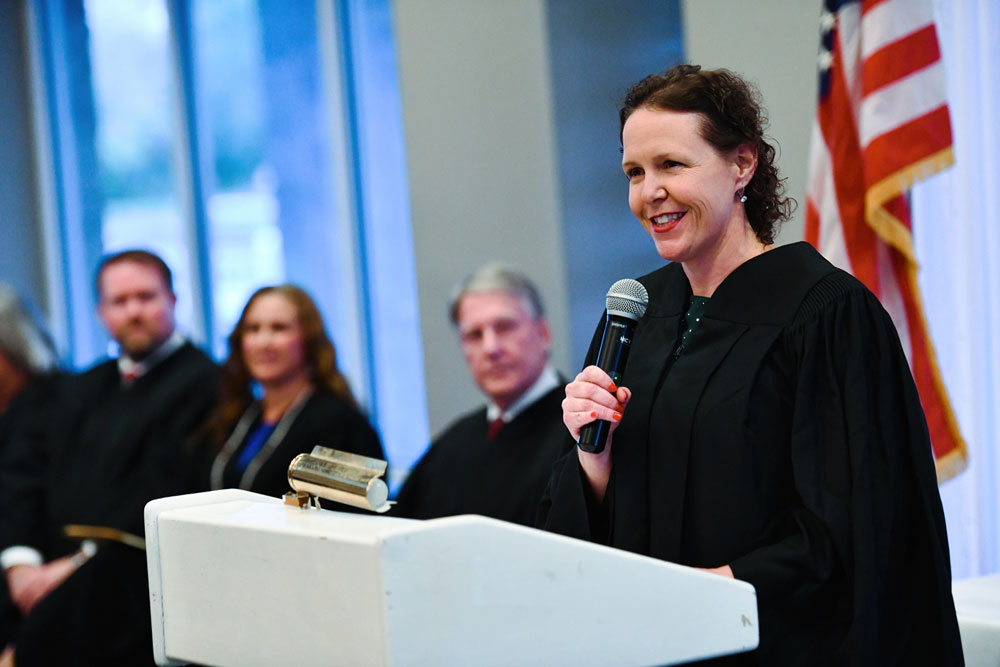
Andrea Totten told what she described as an “outrageous, ridiculous” thing Jakari Young once told her a decade ago in Daytona Beach. Young, who’s now the deputy chief of the Daytona Beach Police Department, had just been promoted to detective. Totten was a new prosecutor in the State Attorney’s Office’s county division. “He came for advice with a warrant or a legal issue or some such thing,” Totten recalled, “and in the course of the conversation, he said to me, you know, you’re going to be a judge someday, I just know it. You’re going to be a judge.”
Of course she didn’t believe him. But it stuck with her. And there she was, Friday evening, speaking into a microphone at her own investiture as Flagler’s newest county judge, with Young among the 90-some people, judges, lawyers, friends and family in the audience and at her side. The recollection of Young’s words had stuck with her for a reason: “He had something nice to say, so he said it,” a theme Totten chose to ascribe to her brief investiture speech, a telling counterpoint to a ceremony symbolizing a power Totten now wields over Flagler County residents as very, very few others–almost all of them in the same room that evening–do.
One of those nice things told to her more recently was Flagler County Judge Melissa Distler’s advice to apply for county judge when the Legislature, behind a push by Rep. Paul Renner, Flagler County’s representative, created the new seat earlier this year. She did. The Judicial Nominating Commission short-listed her, along with five other Flagler County attorneys (from a list of 24), and Gov. Ron DeSantis appointed her. Totten, previously a prosecutor in Daytona Beach, has been serving on the bench since the second week of November.
But Friday was the more public and unique marker of her accession.
As Circuit Judge Terence Perkins explained it at now-Judge Totten’s investiture that evening at Channel Side in Palm Coast, the word investiture is rooted in the Medieval Latin investitura, itself derived from the Latin verb for “to clothe.” And it was, at the heart of it, a clothing ceremony: Totten was to be presented with that black robe judges wear when sitting for court, and she was to make the symbolic transition from her side of the stage with family and friends to the more Olympian side lined with 11 berobed judges, her colleagues from now on.
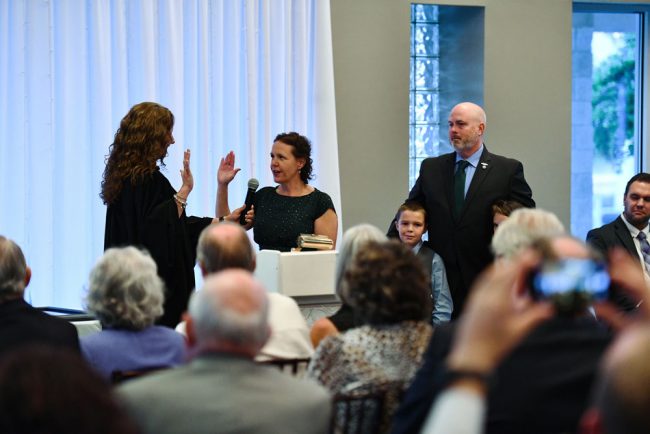
The similarities with a wedding ceremony were not coincidental: investitures are just as solemn, just as joyful (and expensive: the reception was all at Totten’s expense), just as ritualistic, just as flush with symbolism and that measure of poignancy marked by the end of something–Totten is no longer a private citizen in any sense of the term, much as she prized her privacy–and the beginning of something else entirely, some of it quite isolating. Among public servants, judges alone have to tread the paradox of being constantly in the public eye while remaining at a remove from too much public interactions. Impartiality demands it. Their own rules require it. Many decide not to live in the community they serve, if only to be able to shop and take a walk in peace, without risk of coming face to face with an individual who may have felt wronged, though for now it doesn’t appear as if Totten is about to leave her Palm Coast home, a few minutes’ drive from the county courthouse in Bunnell.
Several judges who spoke Friday, including Perkins–Flagler’s felony and chief judge–sought to caution and reassure Totten on those scores, because investitures are also among the rare public rituals when the judiciary lets down its guard a little, when its usually muted members speak with unusual intimacy of the difficulties and challenges of life within those robes.
“Judges,” Perkins, twice the circuit’s chief judge, advised Totten, “are often asked to sort out complex problems, make difficult decisions, sometimes in very high-profile cases, and no matter how seasoned you are or how prepared you are, and I know how prepared you’ll be, those moments will challenge you, they’ll challenge you as a lawyer, they’ll challenge you as a person, and they will challenge you as a judge. Judge Totten, you will have those moments. So making hard decisions is never popular. You must respect this job enough to risk losing it every day, by doing the right thing, not the popular thing. As a result, accepting the role of a judge can be isolating.” But he told her she will not “travel alone,” and that “the justice business is a team sport,” as the system’s success is “directly attributable to the many talented clerks, deputies, judicial assistants, administrative staff, attorneys, all working tirelessly with us to produce the right result.”
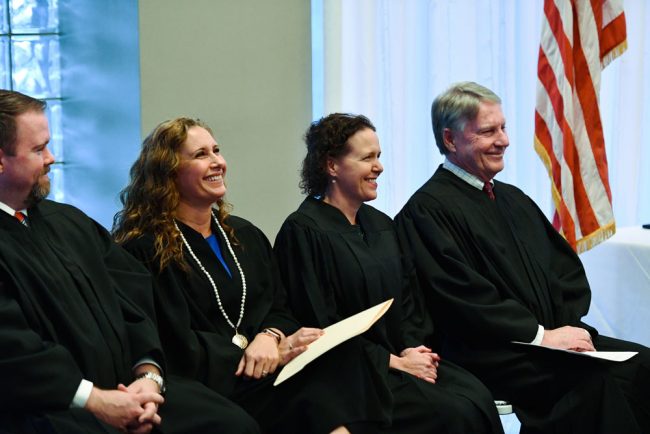
Volusia County Court Judge Belle Schumann spoke of a different kind of isolation: “Know that sometimes you may be unfairly criticized by people who don’t understand the facts as well as you do or understand the law that you must follow. It happens to all of us eventually. As you know or will soon learn at Judge School, the rules of judicial conduct prohibit you from speaking out to defend yourself against an unfair attack, and that is very difficult. It runs counter to your training as a lawyer and an advocate to remain silent. At those difficult times, remember the friends and supporters in this room today and know that you’re not alone.”
Then Schumann offered time-tested advice that has been passed down from judge to judge, from investiture to investiture, “and that is simply to try not to intentionally hurt anyone. You have a hard job, you have to make hard decisions, you have awesome power and responsibility, and frankly, you’re going to hurt some people. But do it because in your judgment it absolutely has to be done.” Schumann also advised the new judge to have fun, spend time with friends and family, relish the fact that “people will now take your phone calls.”
Totten is now one of 16 county judges in the Seventh Judicial Circuit, which includes Flagler, St. Johns, Volusia and Putnam, and one of 324 county judges statewide. She’ll be hearing municipal ordinance violations, cases of panhandling, battery, stalking, drunk driving and minor drug violations, traffic, personal injury, collection, contract disputes, probate and guardianship cases. She’ll be at the receiving end of her share of the 2.6 million cases a year filed in county courts statewide (three times more than in circuit court). “Everyone who comes before you believes that their case is the most important case in the world,” Volusia County Court Judge Chris Miller said, “and they’re looking for you to hear them out, to treat them courteously and to give them a fair ruling. They’re looking to you for their day in court.”
“You must respect this job enough to risk losing it every day, by doing the right thing, not the popular thing.”
Perkins will be Totten’s mentor, but so will Distler, who put Friday’s ceremony in historical context moments before she led Totten in the oath of office.
“What you’re witnessing right now is unprecedented in Flagler County,” Distler said. “This is the first time that we’ve had two county judges, ever. And to put this into perspective, the last time Volusia County had a county judge was in 2006. The last time Flagler County had a county judge was in 2000. The last time St. Johns had a county judge was in 1974, the year I was born.” But she stressed that the new position was to the benefit of citizens and residents, who would be the ultimate beneficiaries of a less overloaded judiciary.
“I’m turning over cases that have been my cases for seven years, and as a judge,” Distler said, “I feel as though I have been the caretaker. I’ve been the caretaker of the citizens, I’ve been the caretaker of these cases, and it’s almost like passing off a child for the first time, you know, like when you leave your child with the babysitter. I’m passing over these cases to Judge Totten for her to be the caretaker.”
David Beller, a Denver attorney who’s known Totten for 20 years and went through law school with her, introduced Totten in what was the equivalent of the best man’s speech–at once deprecating and admiring of his subject, calling her by her nickname (Jonesey), recalling starting law school in the last naive days before 9/11, learning the law as much as “the humanity of the law,” seeing her make her way to American citizenship (Totten is Canadian-born and raised) and the career steps that brought her to the judgeship. “Andrea has made us all extraordinarily proud to be related to her, whether through DNA or by choice,” Beller said, “and I have no doubt that she will make you all proud, too, as she continues her family’s legacy of service first.”
As he spoke, Totten sat on one side of the stage alongside her family while Perkins and the other judges sat en banc, waiting for the transition, on the other: it was in fact an official court session, complete with court reporter, if in delicious proximity Channel Side’s bar, which would soon be flowing. The transition was prefaced by several ceremonial presentations.
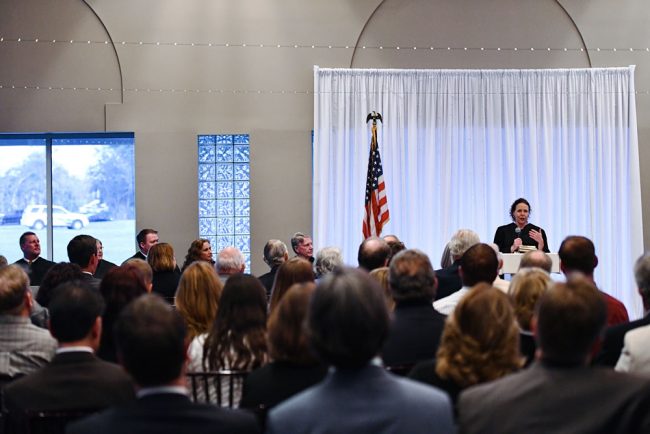
In an ironic twist on a ceremony bejeweled in the reverence for law, the separation of church and state that Jefferson so cherished seemed to have been booted aside: unlike court sessions at the courthouse, where open prayers are not permitted anymore than hatted heads, and where oaths are no longer sworn on bibles in recognition of the pluribus in one seal or another somewhere in every courtroom, the ceremony opened and closed with an elaborate and obstinately Christian prayer by Pastor Jay Zahn of Christ the King Lutheran Church–Totten’s church–and featured the presentation of a bible to the judge. It was to be presented by Aaron Delgado, the Daytona Beach trial attorney, but he couldn’t make it. The task went to Garry Wood, an attorney in private practice who’d supervised Distler at one point when their careers intersected at the State Attorney’s Office in Putnam. He spoke more about himself than about either the bible or Totten. His advice to Totten: “Don’t let Melissa tell you what to do.” (An earlier version of this story incorrectly referred to Wood as an assistant public defender; he was last a public defender in 1994.)
Back to more secular frames, Serena Pines of Community Legal Services of Mid-Florida presented a print of Lady Justice to Totten, a blindfolded Lady to reflect justice’s impartiality, standing near scales with no foundation, because “evidence should stand on its own,” and holding a sword representing the strength of justice. “We’re excited to see another female judge in the area,” Pines said.
Unsurprisingly in a ceremony of lawyers, by lawyers and for lawyers, the spoken parts were not short, and it was only after them all that Totten spoke–what was juristically called her “response”–when she spoke of the unexpected kindnesses and outrageous predictions that have punctuated her young life (she’s only 40), and when she closed simply: “I’m really honored to be able to now serve my fellow citizens in this way and I promise to do my very best work.”
![]()
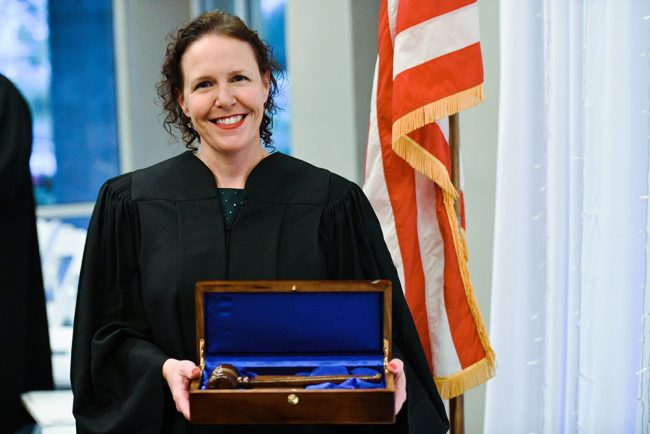





























Garry Wood says
Flagler County is very fortunate to have Judge Totten as our newest county judge. She is certainly qualified for the position. We all are going to benefit for many years to come.
Congratulations to Judge Totten and for Flagler County.
Steve says
Good luck and please stop the plea down madness going on in our County with the forever being arrested repeat Felons. Lock them up
Peaches McGee says
She won’t be in felony court:
“She’ll be hearing municipal ordinance violations, cases of panhandling, battery, stalking, drunk driving and minor drug violations, traffic, personal injury, collection, contract disputes, probate and guardianship cases.”
WILLIAM J NELSON says
CONGRATULATION “JUDGE” HOPEFULLY YOU WILL “NOT” LET THE LIBERAL OPINIONS OF PERKINS INFLUENCE YOU!